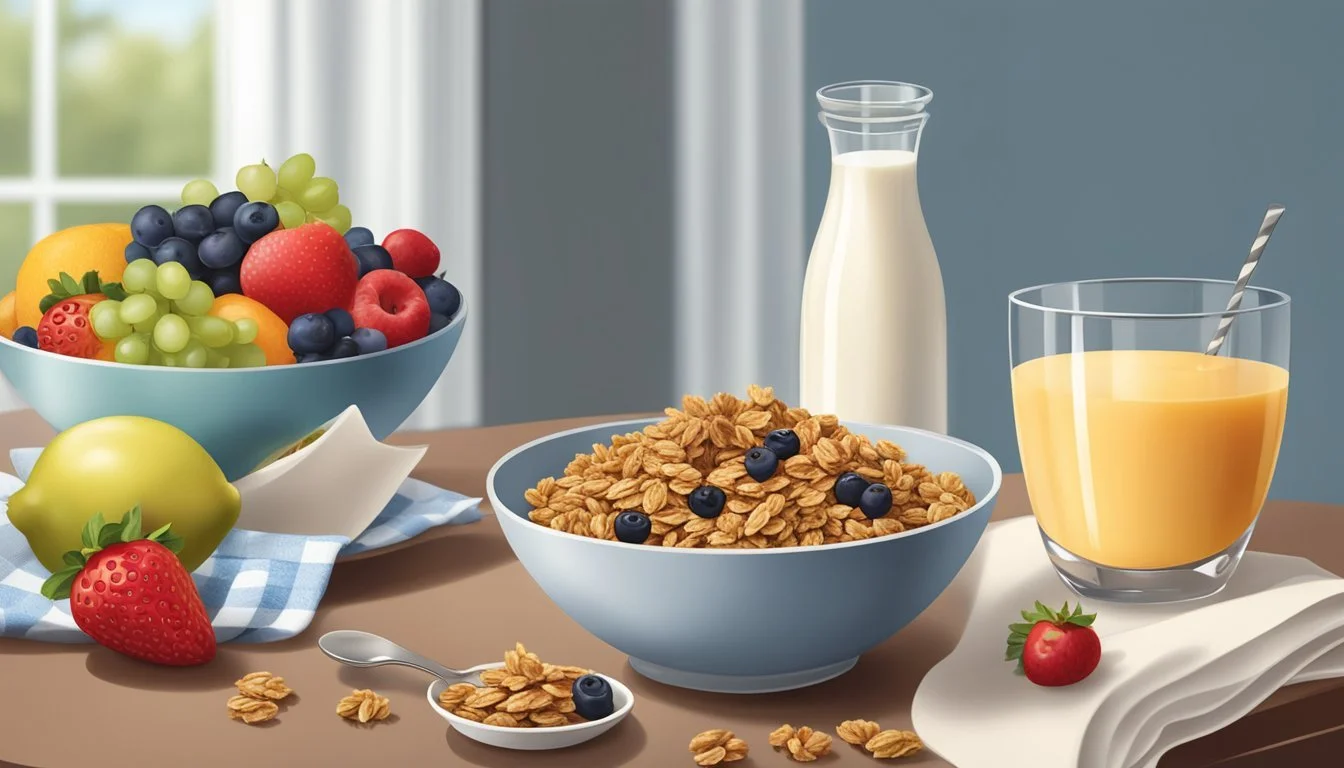Can Pregnant Women Eat Granola?
Understanding the Nutritional Impact
Pregnant women often navigate a complex dietary landscape to ensure they receive the right balance of nutrients for their health and the development of their baby. Granola, with its mix of oats, nuts, seeds, and sometimes sweeteners or dried fruit, can be a nutritious option. It provides a convenient source of fiber, protein, and essential vitamins and minerals, which are critical for fetal development and maternal health.
However, not all granola is created equal. Pregnant women should opt for granola that is low in added sugars and free from excessive artificial additives. Some granola bars and products can be high in calories and sugar, resembling desserts more than healthful snacks. It is important to read labels carefully and choose varieties made with whole foods like real fruits and nuts.
As a well-balanced snack or meal addition, granola can contribute positively to a pregnant woman’s diet. The inclusion of granola can aid in meeting the nutritional needs during pregnancy, as long as it is consumed within the context of an overall nutritious diet and any specific dietary recommendations from healthcare providers are adhered to.
Granola Overview
Granola is a popular food known for its versatility and dense nutritional profile. It's typically made with a combination of whole grains, nuts, seeds, and dried fruit, tied together with sweeteners like honey or maple syrup.
Ingredients and Varieties
Granola's base ingredient is whole grains, most commonly oats. They provide a rich source of fiber and essential nutrients. Varieties of granola mix in different nuts such as almonds or walnuts, which contribute protein and healthy fats. Seeds like pumpkin or sunflower are often included for their nutrient density. Dried fruit can offer additional fiber, vitamins, and a natural sweetness.
Granola may also contain sweeteners, ranging from natural sources like honey to various forms of added sugar. Some varieties include chocolate or flavorful additives that can alter the nutritional content.
Nutritional Content
The nutritional content of granola can vary significantly based on the ingredients used. Generally, it is a high-calorie food with a robust macronutrient profile, including:
Fiber: Essential for digestive health and satiety.
Protein: Important for tissue repair and growth, which may come from nuts and seeds.
Healthy Fats: Often derived from nuts and seeds, supporting overall health.
Granola also contains a variety of vitamins and minerals, contributing to its reputation as a nutritious food choice. However, caloric content must be considered, as granola is often energy-dense, with calories primarily derived from oats, nuts, seeds, and sweeteners.
Benefits of Granola During Pregnancy
Granola offers pregnant women a healthy snacking option packed with nutrients that are crucial for both mother and baby. It also helps maintain energy levels and supports digestive health.
Rich in Essential Nutrients
Granola is an excellent source of several essential nutrients beneficial for pregnancy nutrition. It typically contains whole grains which are high in complex carbohydrates, providing a steady supply of energy. The nuts and seeds found in granola are rich in omega-3 fatty acids, important for the baby's brain development. Dried fruits often added to granola offer iron and vitamin B6, while fortified versions can provide critical vitamin D and folic acid, the latter being essential to prevent neural tube defects.
Folate: Essential for fetal growth and reduces risk of birth defects.
Iron: Supports the increase in blood volume and is vital for delivering oxygen to the baby.
Calcium and magnesium: Important for bone development.
Potassium: Helps maintain fluid and electrolyte balance.
Supports Digestive Health
Pregnant women commonly experience digestive issues such as constipation. Fiber-rich granola can help regulate the digestive system, easing these discomforts. It promotes a healthy gut, potentially reducing the risk of gestational diabetes and preeclampsia. Some granolas may also contain probiotics, which supports gut health further, bolstering the body's natural defenses.
Fiber: Aids in digestion and prevents constipation.
Probiotics: May enhance gut health and support the immune system.
Energy and Appetite
During pregnancy, the body's need for energy increases. Granola made with whole-grain oats provides sustained energy due to its low glycemic index, keeping blood sugar levels stable. This can help manage appetite and prevent overeating. A granola bar or a small bowl of granola can serve as a nutrient-dense snack to curb hunger between meals, making it a practical choice for on-the-go nutrition.
Complex carbohydrates: Sustain energy levels and help manage hunger.
Healthy snack: Convenient and portable, ideal for snacking between meals.
Considerations for Pregnant Women
When selecting granola during pregnancy, it’s important to focus on whole food ingredients and consider moderation, food safety, and personal health sensitivities.
Moderation and Balance
Granola can be a nutritious choice for pregnant women, offering whole grains and essential nutrients. However, high-calorie content and added sugars can be a concern if not consumed in moderation. A well-balanced diet that includes granola should complement other nutrient-dense foods and possibly prenatal vitamins, ensuring an adequate intake of essential vitamins and minerals without excessive calories or sugar.
Potential Allergens and Sensitivities
Granola often contains nuts like almonds, which are nutritious but can be allergenic. Pregnant women with nut allergies or sensitivities, including gluten sensitivity due to grains like wheat or oats, should carefully select granola varieties that cater to their specific dietary needs. Always check labels for allergen information.
Food Safety
Food safety is paramount during pregnancy as the immune system is compromised. Pregnant women should avoid granola made with foods to avoid during pregnancy such as soft cheeses and ensure that any ingredient susceptible to harmful bacteria is properly handled and cooked. Safe food handling practices are crucial, along with abstaining from alcohol.
Healthy Snacking Tips
When considering granola as a snack during pregnancy, it's important for women to distinguish between homemade and store-bought options, and to select nutrient-dense pairings.
Homemade vs. Store-Bought
Homemade granola offers pregnant women control over ingredients, allowing for a reduction in added sugars and the inclusion of whole-grain oats, nuts, seeds, and dried fruits. This ensures that the granola is nutrient-dense, without unnecessary additives. On the contrary, store-bought granola bars can sometimes contain high levels of added sugars and preservatives. It is recommended to read labels carefully and choose brands that prioritize natural ingredients and minimal sugar.
Snack Pairings
Pairing granola with foods high in protein and healthy fats can enhance its nutritional profile. A snack combining granola with Greek yogurt or cottage cheese provides a satisfying mix of fiber, protein, and essential nutrients such as calcium. Additionally, including fresh fruit like berries can add natural sweetness and vital vitamins, while vegetables like carrot sticks paired with hummus offer fiber and protein. Nut butters are another great addition to granola or whole-grain crackers for a snack that is both delicious and sustaining. The aim is to balance macronutrients for sustained energy and satiety.
Alternative Snack Options
When pregnant, it's important for women to select snacks that meet their heightened nutritional needs. Cereal can be a good option, particularly if it is high in fiber and low in sugar. Opt for types that include whole grains and are fortified with essential vitamins and minerals.
For a warm, comforting snack, oatmeal serves as an excellent choice. Packed with fiber, it can help with digestion. To enhance the nutritional profile, one can add a variety of fruits and nuts. Berries, in particular, are rich in antioxidants and Vitamin C, making them a great oatmeal topping.
Avocados are another nutrient-dense snack. They are high in healthy fats, fiber, and potassium, making them ideal for pregnant women's diets. Spread them on whole-grain crackers for added crunch and fiber.
Alternatively, a fresh fruit smoothie can satisfy sweet cravings while providing vitamins and hydration. For protein, string cheese is a convenient and calcium-rich option. Pregnant women can pair it with a piece of fruit for a well-rounded snack.
Air-popped popcorn is a whole-grain snack with a satisfying crunch and is low in calories when made without added oils or butter. It's an excellent source of fiber, making it a great snack for those looking to meet their dietary needs without excess calories.
Here's a quick-reference table of alternative snack options that cater to nutritional needs during pregnancy:
Snack Option Benefits High-Fiber Cereal Whole grains, fortified nutrients Oatmeal with Berries Fiber, antioxidants, vitamin C Avocado on Whole-Grain Crackers Healthy fats, potassium, fiber Fruit Smoothie Hydration, vitamins String Cheese Protein, calcium Air-Popped Popcorn Low-calorie, whole-grain, fiber
Each option listed provides a variety of nutrients essential for both the mother and the developing baby.
Understanding Pregnancy Nutritional Needs
When it comes to nutrition during pregnancy, certain micronutrients and food groups are critical for the development of the baby and the health of the mother.
Key Nutrients for Development
Micronutrients like vitamins and minerals are vital during pregnancy. Folic acid (vitamin B9) is crucial to prevent neural tube defects and is recommended at 400 to 600 micrograms daily. Pregnant women need more iron—about 27 milligrams per day—to support increased blood volume and baby’s growth. Calcium and vitamin D are important for fetal bone development. A daily intake of 1,000 milligrams of calcium and 600 IU of vitamin D is often recommended.
The omega-3 fatty acid DHA is fundamental for brain and eye development, and a daily intake of 200 milligrams is advisable. Choline, also essential for brain health, should be consumed in amounts of about 450 milligrams per day. Inclusion of these nutrients in the diet can be achieved through careful selection of food groups or supplements.
Nutrient Daily Recommended Intake Folic Acid 400-600 micrograms Iron 27 milligrams Calcium 1,000 milligrams Vitamin D 600 IU DHA 200 milligrams Choline 450 milligrams
Managing Special Dietary Concerns
Pregnancy can also present special dietary concerns such as gestational diabetes and iron deficiency. A diet tailored to manage blood sugar levels, rich in fiber and balanced in carbohydrates, can be integral in managing gestational diabetes. For those at risk of iron deficiency, iron-rich foods like lean meats, beans, and fortified cereals should be included in the diet.
Constipation is another common issue, often managed by ensuring a diet high in fiber, sourced from fruits, vegetables, and whole grains. Adequate hydration and physical activity can also alleviate this concern. Pregnant women need to be vigilant about iodine intake to support the baby's thyroid development and brain function, aiming for about 220 micrograms daily. It's beneficial to discuss dietary plans with a healthcare provider to cater to these specific needs and ensure a balanced nutritional intake for pregnancy.
Diet Concern Management Strategy Gestational Diabetes Fiber-rich, balanced carbs Iron Deficiency Iron-rich foods, supplements Constipation High fiber, hydration, activity Iodine Deficiency 220 micrograms daily
Conclusion
Granola can be a beneficial part of a pregnant woman's diet, given its nutritional value. It typically comprises whole grain oats, nuts, seeds, and dried fruit, which collectively contribute essential vitamins, minerals, and fiber to support both the mother's and baby's health.
Nutritional Benefits:
Whole grain oats are rich in iron and fiber, aiding in digestion and preventing anemia.
Nuts and seeds provide omega-3 fatty acids vital for the baby's brain development.
Dried fruits offer a quick energy source and contain important vitamins and minerals like potassium and vitamin C.
A well-balanced diet during pregnancy should include a variety of foods to ensure adequate nutrient intake. Granola, when chosen with low sugar content and without harmful additives, fits well into a healthy lifestyle. However, it's essential for expectant mothers to consider potential allergens and to choose granola with care, focusing on products with low added sugars and sodium.
In moderation, granola serves as a nutritious snack option. Women should integrate it as part of a diverse diet, alongside other wholesome snacks like avocado toast, to maintain a balanced intake of nutrients necessary for a healthy pregnancy. Always consult with a healthcare provider for personalized nutritional advice.






